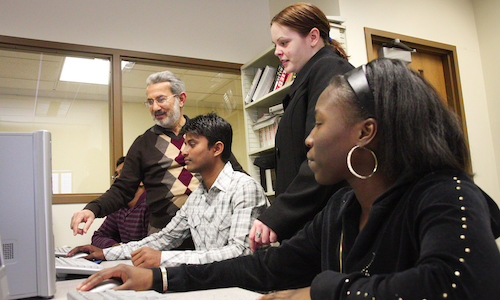
Given a career that stretched back to the mid-1980s, it’s not surprising that Professor Elsayed Orady’s legacy at UM-Dearborn is a story best told in chapters. Mechanical Engineering Professor PK Mallick still remembers some of the earliest years of that story — when the two first became acquainted in a close-knit School of Engineering, which back then, had a faculty roster that numbered in the thirties. Mallick had the office a few steps away, and his own open-door policy and Orady’s warm, outgoing personality became the ingredients for a longtime friendship.
“He would drop in frequently and we would talk about so many things,” Mallick said of his friend who died earlier this month at age 72. “He loved this place, and often the conversations were about the department or the college or our students. Other times, it was what was going on politically back in his home country of Egypt, his family, his faith. He was a very devout Muslim. If there was religious holiday or festival, he would drop off sweets for me. That is the kind of person he was. Obviously, he leaves a void here in our college, but when I think of Elsayed, I think of him foremost as my friend.”
Orady and Mallick spun that friendship into several research collaborations in the 1980s and 1990s — back when such inter-department efforts were still pioneering. In fact, Professor Armen Zakarian, chair of the Department of Industrial and Manufacturing Systems Engineering, said research itself was more the exception than the rule in those days. He said Orady was among the faculty who helped seed that early engineering research culture at UM-Dearborn, and spearheaded projects that brought in some of his department’s first outside research grants.
Having come of age during the zenith of traditional manufacturing, Orady had a particular passion for old-school methods — what Zakarian called the “milling, drilling and grinding” of the manufacturing universe. Though in more recent years, breakthroughs like 3D printing and rapid prototyping have pushed such subjects from the spotlight, Orady was considered the department’s go-to resource on these topics, which are still seen as core to manufacturing education.
“It’s hard to understate his passion for traditional manufacturing. I remember up until a few years ago, Orady thought we should have a foundry on campus,” Zakarian said, smiling. “He thought students gained a certain kind of understanding from having really hands-on, intimate knowledge of materials and processes. And I think that on a practical and production level, this expertise is indeed valuable, even as research moves on in different directions.”
In later years, Orady made his mark at UM-Dearborn in other ways. He was a crucial part of building the multifaceted research labs now housed within the Manufacturing Systems Engineering Lab. For years, he also led the college-wide senior design competitions, and he served in leadership roles on various committees and the Faculty Senate.
Zakarian said one of Orady’s subtler, but strongest contributions to their college was his strong sense of history. In meetings, he remembers, Orady often would tell stories about his own predecessors at UM-Dearborn, often with reverence in his voice.
"In academia, progress doesn’t happen overnight, and I think things that happened 20 or 30 years ago — this is what creates progress,” Zakarian said. “We would not have new buildings, new research opportunities, 80 faculty and Ph.D. programs without people making those critical transformations along the way. Orady was one of those people. I’m sure in meetings we will now be talking about Orady the way he talked about the people he revered who came before him.”




